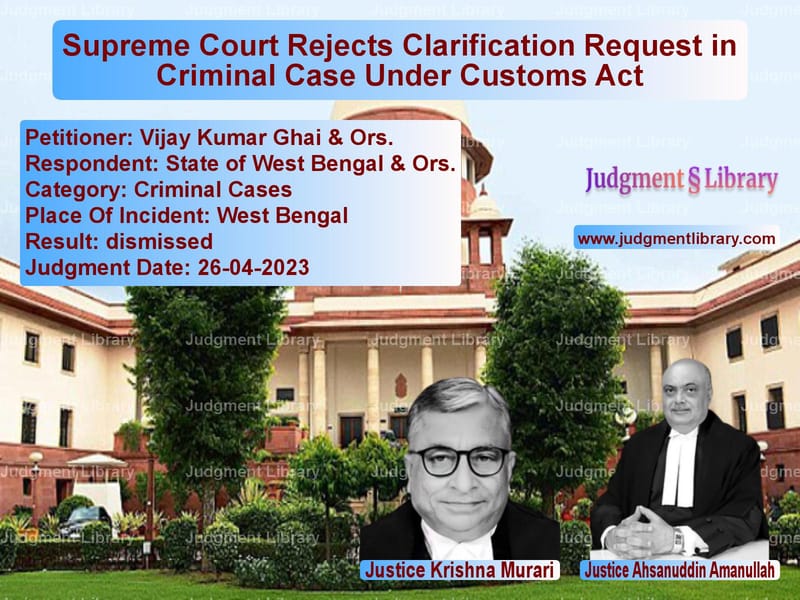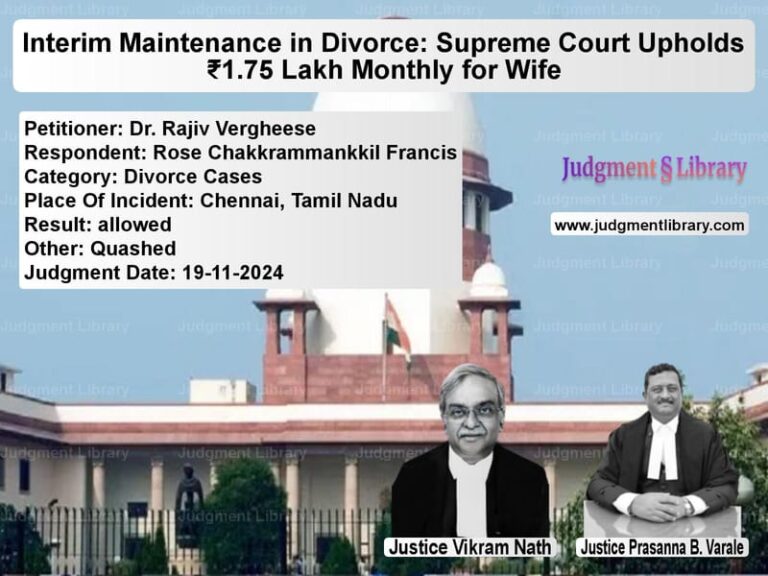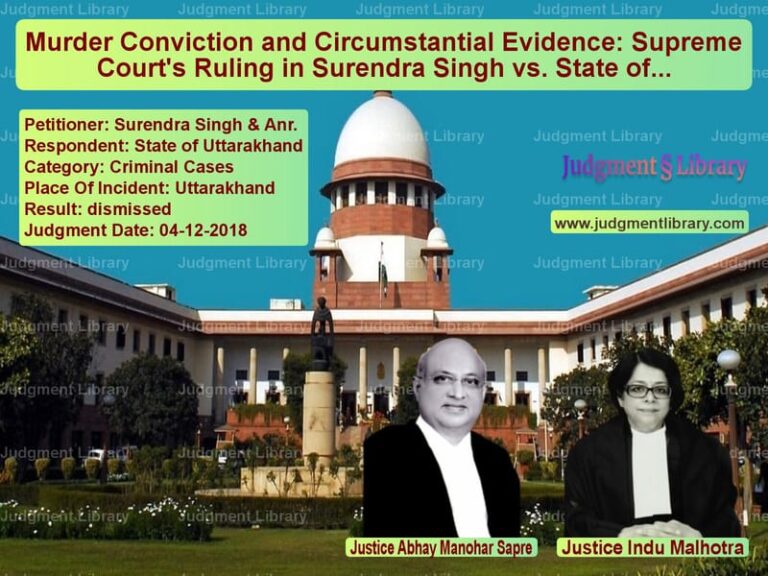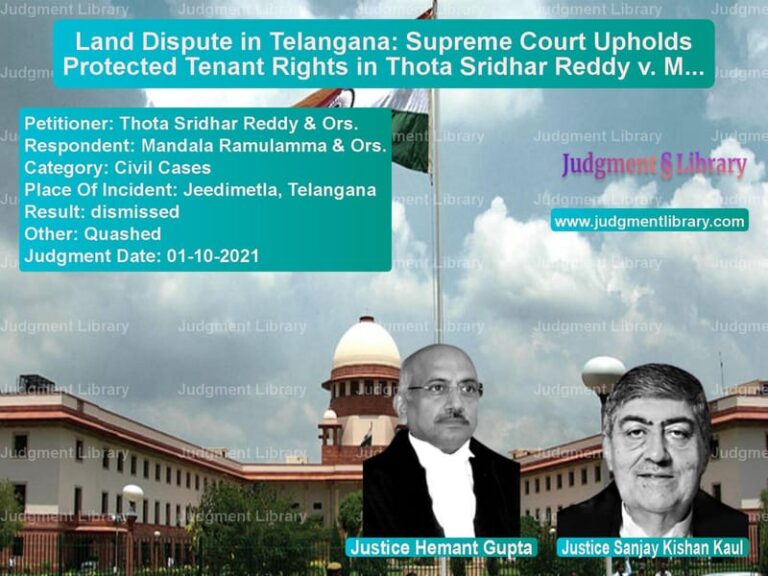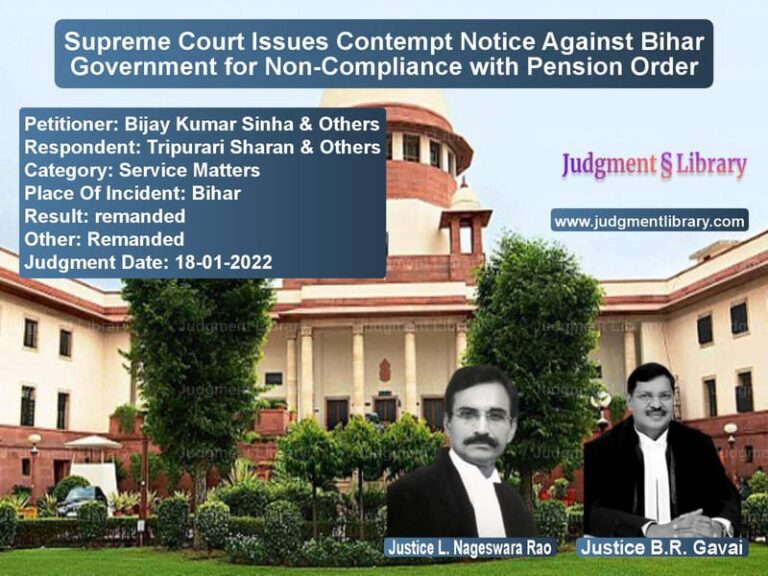Supreme Court Rejects Clarification Request in Criminal Case Under Customs Act
The Supreme Court of India recently ruled in Vijay Kumar Ghai & Ors. vs. State of West Bengal & Ors., rejecting a plea by an applicant, Amit Jalan, seeking clarification of an earlier judgment. The applicant, who was not a party to the original case, requested that the ruling in Criminal Appeal No. 463 of 2022 be applied to his case, where he faced criminal proceedings under the Customs Act. The Court dismissed the application, emphasizing that the applicability of legal precedents must be determined by the concerned courts based on case-specific facts.
Background of the Case
The case involved criminal prosecutions under Sections 132 and 135 of the Customs Act, 1962, initiated by the Revenue Department against Amit Jalan. These proceedings stemmed from three adjudication proceedings, all of which were ultimately decided in Jalan’s favor by the Customs, Excise, and Service Tax Appellate Tribunal (CESTAT). Despite this, the criminal cases against him remained ongoing.
The applicant cited the Supreme Court’s judgment in Criminal Appeal No. 463 of 2022 (decided on 22 March 2022) as a precedent that should be extended to his case, arguing that his continued prosecution was an abuse of the legal process.
Arguments of the Applicant
The applicant, through his legal counsel, contended:
- That his case was identical in nature to the one decided in Criminal Appeal No. 463 of 2022.
- That the Supreme Court’s ruling in that case, which set aside criminal proceedings under similar circumstances, should not be restricted to the facts of that particular case.
- That continuing his criminal prosecution despite favorable CESTAT orders violated the principles of justice.
- That the Supreme Court should issue a clarification making its previous ruling universally applicable.
Arguments of the Respondents
The State of West Bengal and the Revenue Department opposed the plea, arguing:
- That the Supreme Court’s judgment in Criminal Appeal No. 463 of 2022 applied to a specific set of facts.
- That the applicability of legal precedents must be determined by the courts handling individual cases.
- That an applicant who was not a party to the original case could not seek a general clarification binding on all courts.
Supreme Court’s Observations
The Supreme Court, comprising Justices Krishna Murari and Ahsanuddin Amanullah, dismissed the application with the following key observations:
- “The law declared by this Court is binding on everybody, but an authority or court seized with a particular case must test the facts of that case to determine if the law applies.”
- “An application for clarification cannot be used to seek a blanket declaration extending a judgment to all cases.”
- “We have no reason to doubt that the lower court or authority handling the applicant’s case will adjudicate the matter fairly and apply the relevant Supreme Court ruling if appropriate.”
Final Judgment
The Supreme Court ruled:
- The application for intervention was rejected.
- The request for clarification was dismissed.
- The concerned courts and authorities must determine whether the judgment in Criminal Appeal No. 463 of 2022 applies to the applicant’s case.
Implications of the Judgment
This ruling has significant implications for judicial process and legal precedents:
- Judicial Independence: The decision reinforces that lower courts and tribunals must assess the applicability of Supreme Court rulings based on case-specific facts.
- Limits on Blanket Applications: The judgment prevents individuals from misusing clarification requests to obtain sweeping rulings that override case-by-case judicial determinations.
- Customs Act Enforcement: The ruling confirms that criminal prosecutions under the Customs Act remain valid unless quashed through appropriate legal procedures.
Conclusion
The Supreme Court’s verdict in Vijay Kumar Ghai & Ors. vs. State of West Bengal & Ors. affirms that legal precedents must be applied on a case-by-case basis. While Supreme Court rulings are binding, their applicability must be determined by the relevant courts based on individual case facts. This decision prevents arbitrary extensions of judicial decisions and ensures that legal principles are applied appropriately within the judicial framework.
Petitioner Name: Vijay Kumar Ghai & Ors..Respondent Name: State of West Bengal & Ors..Judgment By: Justice Krishna Murari, Justice Ahsanuddin Amanullah.Place Of Incident: West Bengal.Judgment Date: 26-04-2023.
Don’t miss out on the full details! Download the complete judgment in PDF format below and gain valuable insights instantly!
Download Judgment: vijay-kumar-ghai-&-o-vs-state-of-west-bengal-supreme-court-of-india-judgment-dated-26-04-2023.pdf
Directly Download Judgment: Directly download this Judgment
See all petitions in Bail and Anticipatory Bail
See all petitions in Custodial Deaths and Police Misconduct
See all petitions in Judgment by Krishna Murari
See all petitions in Judgment by Ahsanuddin Amanullah
See all petitions in dismissed
See all petitions in supreme court of India judgments April 2023
See all petitions in 2023 judgments
See all posts in Criminal Cases Category
See all allowed petitions in Criminal Cases Category
See all Dismissed petitions in Criminal Cases Category
See all partially allowed petitions in Criminal Cases Category

